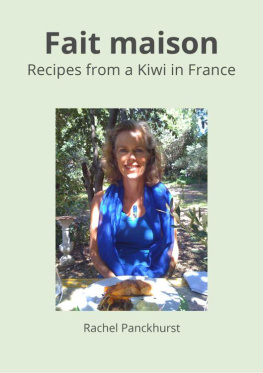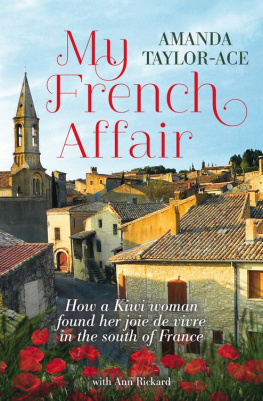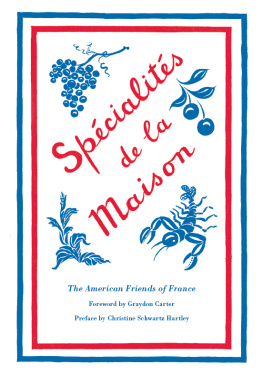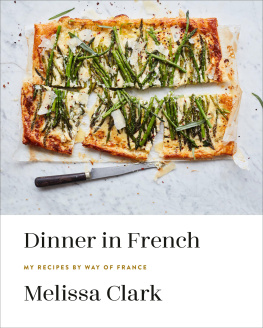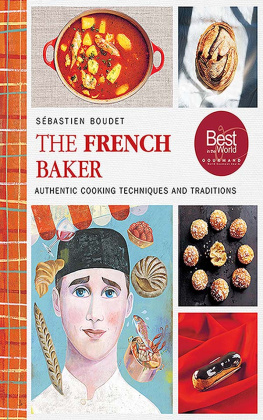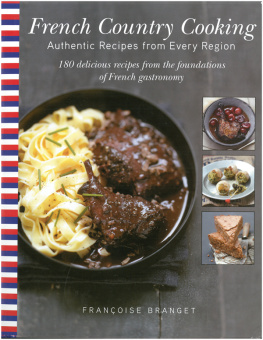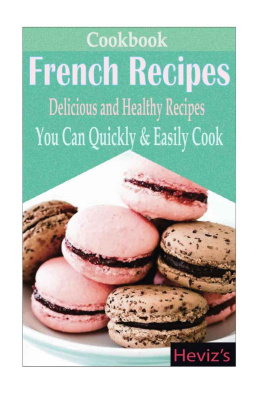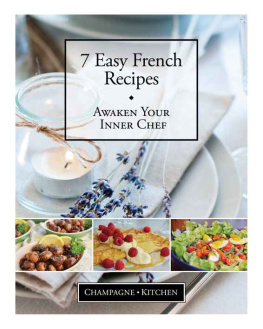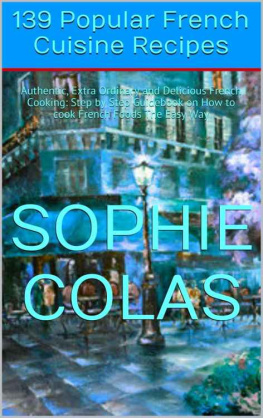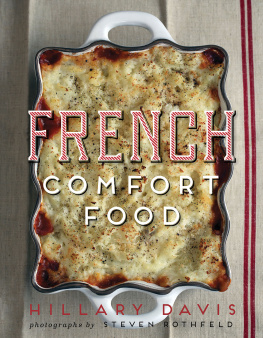Recipes from a Kiwi in France.
This is a Leanpub book. Leanpub empowers authors and publishers with the Lean Publishing process. Lean Publishing is the act of publishing an in-progress ebook using lightweight tools and many iterations to get reader feedback, pivot until you have the right book and build traction once you do.
To my parents, Fay and John, who can remember in detail many meals eaten in different countries over the years. My love for food, partaken with family and friends, dates back to my childhood. And to my French-born son, Saji, who will, I hope, continue the tradition through to the next generation.
Introduction
What better way to celebrate three decades of living in a country with such respect for food than to write a book combining my own recipes with those from friends, family and colleagues?
Over the years, Ive gathered recipes for classic and everyday French cuisine, alongside recipes and tips from four other continents. Some are adapted to the French palate, others are not. Some contributors shared a connection with France or the French language (as in Quebec or North/West Africa). Sometimes a recipe has been included from those jewels of the Pacific, New Zealand and Australia, just because a homesick Kiwi found she couldnt live without them and her French friends loved them.
France has always been a cultural melting pot and its geographical position is such that French cuisine is influenced by many other traditions, although French patriots wont necessarily admit to this. Ive witnessed this assimilation happening ever since I arrived here. In the south of France, there is a high population of North Africans and Spaniards, largely as a result of past wars and colonisation. Such has been their influence on food in France, that some French, asked to name their national dish, joke that its couscous rather than the clich frogs legs or snails.

A French kitchen in the south of France
My favourite cuisine is Mediterranean, including simple French food from the south (with liberal use of olive oil and fresh market produce), and dishes from North Africa since cooking in the south of France invariably includes recipes from the other side of the Mediterranean. Some foods are served raw, or marinated and slightly cooked, others are steamed or baked. I dont often fry food, unless its the middle of winter and I feel like sinking my teeth into a good steak, and even that often tastes better grilled.
In translating some of these recipes from French, Ive also taken into account utensils and measures used in preparation. In France, metric measurement is the rule, while Anglo-Saxons still often use the imperial cup, for example. In France, a teaspoon becomes a coffee spoon or cuillre caf or more simply petite cuillre, and traditional French ovens are often gas, and therefore measured by thermostat, not always in Celsius. I have standardised these measures for international use. Unless otherwise specified, most recipes cater for four to six people.
 | Yeast/baking powder: In France, self-raising flour is seldom used. Plain flour is preferred, with added (11 g) sachets of levure chimique chemical yeast of which the Anglo-Saxon equivalent is baking powder. It contains starch, sodium bicarbonate and sodium pyrophosphate. All of the recipes in this book use this specification. For baking bread, one uses levure boulangre, which is dry bakers yeast. |
Food is a way of life in France. I hope this book of simple, everyday recipes blending in international influences will give a new perspective on just how closely food is entwined with daily life in France.
The recipes Ive chosen are all quick and easy and use readily available ingredients. Most are for everyday. Those suitable for special occasions take hardly any longer to prepare.
I hope you find the recipes as delicious as I do!
Bon apptit!
Destination France
My first taste of France came in 1975 when my parents obtained a six-month sabbatical to London. Including my brother Michael, the four of us lived in a small apartment in Bloomsbury. I continued my education via the New Zealand correspondence school but complained at having left my friends back in New Zealand. At thirteen or fourteen, what is more important than friends?
The highlight of our stay was a six-week campervan tour of Europe, including France. Driving 5,000 kilometres on the wrong side of the road must have been very stressful for my parents, and changing lanes somewhere near Toulouse, we banged into a car. The accident and the needed repairs were minor, and nobody was hurt, but it was our first experience of trying to speak French in a stressful situation. The woman driving the car spoke no English and our phrase-book French was hopeless. We looked for the expression Im sorry and could find nothing; how to ask for an ashtray in a restaurant was included though! The incident was eventually sorted out by other means: my mother understood when the woman touched her ring that she wanted to contact her husband before filling in the constat amiable or accident sheet.
My diary of that time contains a lot of detail on food: either market variety (French baguettes, pt, cheese, grapes and apples bought at the roadside, Spanish melons, Italian market pizzas), or restaurant food and cheap wine:
27/8/75 Arrived in France by hovercraft about 11.50 a.m., drove off and experienced real Frenchmen, right-hand drives & cyclists by the million. Great fun, pity we cant speak French entirely. Stopped in several villages on our way to Paris & bought some French bread & pt for lunch. Cest parfait!
4/9/75 Had breakfast of French bread (made in long rolls which you break off according to your consumption rate) & cereal (Weve been having French bread for a week, the sliced stuff is very scarce & pricey, but the rolls are baked every day & are usually very nice).
9/9/75 Later [we drove along] country roads with grapes dangling on bushes (very tempting) in rows of millions; we even saw people harvesting the grapes and at that stage they had a truckload full! We bought a kilo of grapes later (which we ate for dinner & were very beautiful & very cheap) & some apples also very cheap.
I also vividly remember picking apples from trees growing at the roadside, before racing back to the campervan chased by an angry farmer! French people seem to respect these open orchards; in three decades I have not once seen people helping themselves to fruit in private properties.
10/9/75 Stopped at Arles to see the Roman amphitheatre which was very impressive. Lots of dark passages & supposed lion pits; it was used as an arena for festivities by the Romans & is now used for bullfights. Had a look around Arles & bought some bread, biscuits, cheese, pt & set off on our travels.

